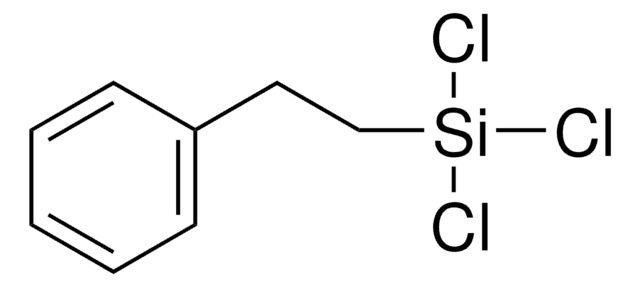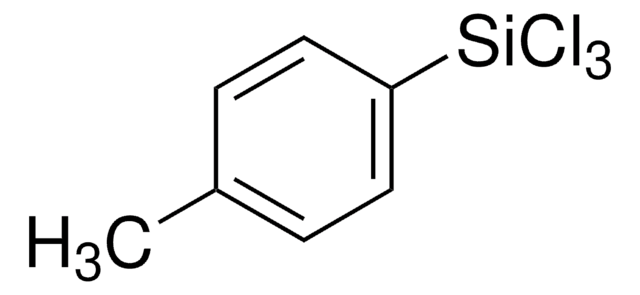440108
Trichloro(phenyl)silane
≥97.0%
Synonym(s):
Phenyltrichlorosilane
Sign Into View Organizational & Contract Pricing
All Photos(1)
About This Item
Linear Formula:
C6H5SiCl3
CAS Number:
Molecular Weight:
211.55
EC Number:
MDL number:
UNSPSC Code:
12352100
PubChem Substance ID:
NACRES:
NA.21
Recommended Products
Quality Level
assay
≥97.0%
form
liquid
refractive index
n20/D 1.523 (lit.)
bp
201 °C (lit.)
density
1.321 g/mL at 25 °C (lit.)
SMILES string
Cl[Si](Cl)(Cl)c1ccccc1
InChI
1S/C6H5Cl3Si/c7-10(8,9)6-4-2-1-3-5-6/h1-5H
InChI key
ORVMIVQULIKXCP-UHFFFAOYSA-N
Looking for similar products? Visit Product Comparison Guide
Related Categories
General description
Trifluoro(phenyl)silane can react with aliphatic alcohols to yield benzene and alkoxyfluoro and tetraalkoxysilanes. Hydrolytic condensation of this silane in its vapor phase results in the formation of 1,1,3,3-Tetrachloro-1,3-diphenyldisiloxane.
signalword
Danger
hcodes
Hazard Classifications
Acute Tox. 4 Dermal - Eye Dam. 1 - Skin Corr. 1A
supp_hazards
Storage Class
8A - Combustible corrosive hazardous materials
wgk_germany
WGK 1
ppe
Faceshields, Gloves, Goggles, type ABEK (EN14387) respirator filter
Choose from one of the most recent versions:
Already Own This Product?
Find documentation for the products that you have recently purchased in the Document Library.
Customers Also Viewed
Qian Wu et al.
Journal of hazardous materials, 336, 222-231 (2017-05-12)
In this study, a novel strategy was developed to fabricate highly flame retardant polymer foam composite materials coated by synthesized silicone resin (SiR) polymer via a facile dip-coating processing. Applying the SiR polymer coating, the mechanical property and thermal stability
Syntheses and structural analyses of 1, 3-diphenyldisiloxanes as a building block of silsesquioxanes.
Bulletin of the Chemical Society of Japan, 76(10), 1983-19887 (2003)
Cleavage of the C-Si bond in Trifluoro (phenyl) silane with Aliphatic Alcohols.
Russ. J. Gen. Chem., 75(12), 1927-1929 (2005)
Xiaona Wen et al.
Bioengineering & translational medicine, 5(3), e10165-e10165 (2020-10-03)
Precise monitoring of specific biomarkers in biological fluids with accurate biodiagnostic sensors is critical for early diagnosis of diseases and subsequent treatment planning. In this work, we demonstrated an innovative biodiagnostic sensor, portable reusable accurate diagnostics with nanostar antennas (PRADA)
Phillip C Chambers et al.
Beilstein journal of nanotechnology, 9, 1211-1219 (2018-05-17)
Nanostructures of 4-(chloromethyl)phenyltrichlorosilane (CMPS) were used as a foundation to attach and grow heterostructures of porphyrins and organosilanes. A protocol was developed with particle lithography using steps of immersion in organosilane solutions to selectively passivate the surface of Si(111) with
Our team of scientists has experience in all areas of research including Life Science, Material Science, Chemical Synthesis, Chromatography, Analytical and many others.
Contact Technical Service











